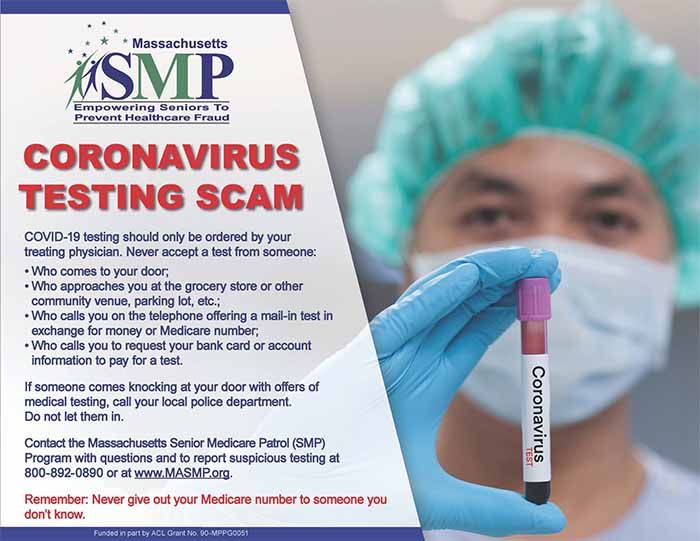The Department of Justice is focused on cyber-crime, sale of counterfeit goods, treatment scams and other healthcare and investment scams during the coronavirus pandemic, according to Andrew Lelling, United States Attorney for the District of Massachusetts.
While the international focus is in on the pandemic, scammers see a platform to prey on fears, anxieties and misinformation.
In one reported incident in Central Massachusetts, people in a white van, wearing hazmat suits, claimed to be testing homes for coronavirus. Massachusetts State Police received one such report, while the Hubbardston Police Department said they had received similar reports from surrounding towns.
A nationwide shortage of supplies needed for testing COVID-19 is an opportunity for scammers, often targeting seniors for healthcare fraud.
Massachusetts SMP [Senior Medicare Patrol] is a statewide consumer protection program aimed at protecting seniors. Their most recent campaign warns of door to door, in-person and telephone offers for testing, often fishing for a credit card or Medicare number.

Testing for the coronavirus is only available to those who have specific symptoms criteria and a prescription from a clinician and medical personnel or EMT.
Residents in the Northampton area have reported recent calls of traditional scams. These callers claim to be State Police, fishing for credit card or other identification information to clear up a warrant or because their identity has been stolen.
The Consumer Education Division of the Federal Trade Commission (FTC) warns consumers to:
- Watch for emails claiming to be from the Center for Disease Control and Prevention (CDC) or World Health Organization (WHO). Instead, visit their websites for the most updated information.
- Ignore online offers for vaccinations and ask yourself: If there is a medical breakthrough, would you be hearing about it for the first time in an advertisement or sales pitch?
- Do your homework when it comes to donations, whether through charities of crowdfunding sites.
- Be alert to “investment opportunities.” The U.S. Securities and Exchange Commission (SEC) is warning people about online promotions, including on social media, claiming that the products or services of publicly traded companies can prevent, detect, or cure coronavirus and that the stock of these companies will dramatically increase in value as a result.
If you believe you have been targeted for fraud or by a scammer, you can contact the United States Attorney’s Office at [email protected] or call 1-888-221-6023 and leave a message.
If you come across any suspicious claims, report them to the FTC at ftc.gov/complaint.
Photo Credit: Artem Beliaikin from Pexels









